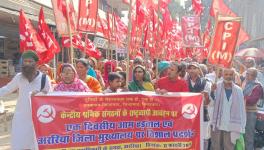Protest Sites at Delhi’s Borders See Farmers, Workers Unite to Fight Farm Laws
New Delhi: The agitating farmers staging their protest against the farm laws on the entry gates of the national capital observed Kisan Mazdoor Ekta Diwas on Saturday, with thousands from neighbouring Punjab and Haryana flocking to the borders to express their solidarity.
The Samyukta Kisan Morcha - a collective of farmers’ unions- had called for celebrating the unity of farmers and workers arising out of struggle against the laws on the birthday of social reformer and 15th century poet, Ravidas, and the martyrdom day of legendary freedom fighter Chandrashekhar Azad. Later, devotees of Ravidas carried out a Nagar Kirtan where chants and m slogans amalgamated with each other.
According to the organisers, thousands of people landed up the previous night. Sukhwinder Singh, who runs Saanjhi Satt or Shared Chaupal, told NewsClick: “Thousands of people, especially the followers of Ravidas, came the previous night and stayed at different places to participate in the nagar kirtan to deliver their message of unity.”
Beating the blazing sun, the protest site saw a considerable increase in the strength of protesters, with farmers maintaining that rotation of people coming from villages had become an integral part of the struggle. Simultaneously, farmers appeared prepared for the scorching heat in coming days with water coolers and air-conditioners installed at the site.
The programme at Singhu border saw massive participation of industrial and social sector workers, who rallied from Saanjhi Satt near KFC to the main stage.
K Hemlatha, president, Centre for Indian Trade Unions, who participated in one of the marches, told NewsClick that it was historic that workers and farmers had come together in this joint struggle because the onslaught on both these sections of the society almost came at the same time.
“The unity started building when the farmers and workers came together on November 26 last year in the historic strike call by Central trade unions. The farmers’ unions extended their support to us against unjust labour codes and we showed solidarity to them in fighting farm laws,” she said.
Abhishek, secretary of AICCTU Delhi, said the food insecurity and privatisation affects everyone. ”It is not only industrial workers but workers from government enterprises too have joined the protest. The government has its business and has started disinvesting in every public sector undertaking. So, it is the collective anguish which is getting reflected today.”
Trade unions have been protesting the labour codes brought in by the Narendra Modi government after dismantling 44 labour laws, facilitating 12-hour work days and abolition of labour courts for dispute resolution, among other controversial provisions.
To a question if industrial workers too will join the struggle, given that mandi and agricultural workers are currently at the forefront of the farmers’ protests, Hemlatha said: “Industrial workers are not only participating physically but have collected money from workers to support the farmers and the support is pouring nationwide.”
Away from the Singhu border, fire-brand farmer leader and Bhartiya Kisan Union Ekta President Joginder Singh Ugrahan, addressing farmers at the Tikri border, said that Ravidas and Chandrashekhar Azad both fought oppression, albeit in different styles.
“Ravidas established the fact that caste is not created by god and indeed it’s a human construct to achieve their vested interests. He imagined a society where no one would sleep hungry. Similarly, Azad, who swore that he would die free, looted British money, strengthened the Independence movement and never inflicted harm on Indians. It is their heritage and legacy that we need to cherish on this day,” said Ugrahan.
Sitting under the shade of a tent, Harman Singh and his wife Rueben Kaur from Rajool in Ludhiana said people had begun to realise that the farm laws, especially the third law -- Essential Commodities (Amendment) Act -- would affect everyone, devoid of their religion, caste or status.
Talking with NewsClick, Singh said: “When we talk about workers and farmers unity, we clearly say that the workers who have been running the mandis, tending our farms or manufacturing fine goods in factories are one. There is no difference. It’s our compulsion to unite to fight these atrocious laws.”
Kaur interjected to say: “The movement has changed the social life in villages. People wear either black or white clothes to express their anguish. They have put flags, banners atop their homes. Even gurudwaras, through their loudspeakers, call people to unite in prayers to defeat this anti-people regime. I think these acts only show our determination. The government may not be willing to talk today, but how long can it ignore the people.”
Dhanna Singh, who came from Ambala, said even if the farm laws get implemented, farmers would not survive unless they receive additional income support from the government.
”How will Indian farmers compete with European agri- based and dairy companies when it is a known fact that farmers in Europe receive income support in billions of euros in subsidy and cash transfers,” he said.
Singh, who shared tale of the 1971 war and other historic events with fascination, became emotional while recalling the days of demonetisation. “The rulers do not apply their mind when they introduce something abruptly. Bankers asked our daughters who were getting married to when they stood in queues. We cannot tell you how disturbing it was!”
Another farmer from Barauda in Sonipat said people were asked to get coupons from police stations to collect a mere Rs 2,000 note. “Nobody could even get treatment for fever with that amount of money,” he added.
The farmers’ protest, in a sense, appears to be blurring caste differences, as speakers on the main stage recalled the founding of Begumpura - a concept of casteless society devised by Ravidas -- where people live without any sorrow.
Advocate Harjeet Singh, standing beside the garlanded portraits of Ravidas and Azad, said: “We have been hearing about Begumpura since our birth but never witnessed it. I think these protest sites are examples of how we should have a society where people can unite without any difference for a cause.”
A preacher, who came from Punjab especially for Saturday’s event, recalled the huge audience that Ravidas drew and told people to be defiant, and exercised his knowledge to practice justice. “I think the people use their education best when they fight for justice and liberty. Our youth used it to fight jabr (excesses).”
Away from hustle and bustle, Sajno Devi who works as an ASHA worker, simply put her case. “People have not forgotten their roots. We are both workers and farmers. Both endure misery. I think it was natural for us to come together.”
Get the latest reports & analysis with people's perspective on Protests, movements & deep analytical videos, discussions of the current affairs in your Telegram app. Subscribe to NewsClick's Telegram channel & get Real-Time updates on stories, as they get published on our website.
























